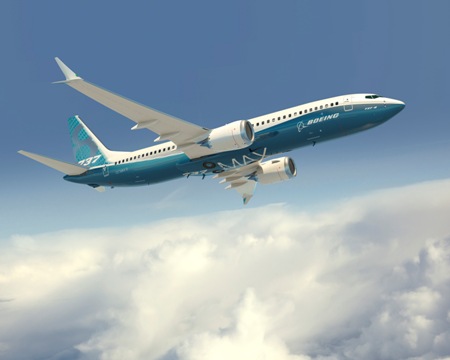RENTON, Wash., July 23, 2013 /PRNewswire/ -- Boeing (NYSE: BA) has completed the firm configuration of the 737 MAX 8. This milestone marks completion of the major trade studies that define the capabilities of the 737 MAX family.
"We have defined the design requirements for the 737 MAX that provide our customers with the most value in the single-aisle market," said Michael Teal, chief project engineer, 737 MAX, Boeing Commercial Airplanes. "We continue to follow our disciplined process to ensure that we have completed all the requirements for the development stage of the program and are ready to begin the detailed design phase."
As detailed designs are completed and released, production can begin. Final assembly of the 737 MAX 8 is scheduled to begin in 2015 with first delivery scheduled for the third quarter of 2017.
The 737 MAX will be 13 percent more fuel-efficient than today's most efficient single-aisle airplanes and 8 percent more fuel-efficient per seat than tomorrow's competition. The configuration includes new LEAP-1B engines from CFM International that are optimized for the 737 MAX, a redesigned tail cone and the Boeing designed Advanced Technology Winglet to reduce fuel use. Other changes incorporated include upgrades to the flight deck displays, an electronic bleed air system and fly-by-wire spoiler flight controls.
"The 737 MAX will not only be the most fuel-efficient airplane, it will maintain the 737's industry-leading reliability," said Keith Leverkuhn, vice president and program manager, 737 MAX program, Boeing Commercial Airplanes. "We are working closely with our customers and industry partners to ensure that the airplane we deliver will perform as promised."
Additionally the MAX will take advantage of advancements in connectivity. "As we continue to improve connectivity on the 737 platform, the 737 MAX will offer customers the capability to use real-time data to make operational decisions around maintenance on the ground during flight," said Leverkuhn. "This will allow airlines to more efficiently manage their fleets. Enhanced connectivity also will benefit passengers as the demand for more wireless access to information and entertainment in flight continues to grow."
The 737 MAX family includes the 737 MAX 7, 737 MAX 8 and 737 MAX 9 and will serve the 100- to over 200-seat market. The 737 MAX will extend the Next-Generation 737 range advantage with the capability to fly more than 3,500 nautical miles (6,482 km), an increase of 400-540 nmi (741-1,000 km) over the Next-Generation 737. First delivery of the 737 MAX 9 is planned for 2018 followed by first delivery of the MAX 7 in 2019.
To date, the 737 MAX has accumulated orders for 1,495 airplanes.
Forward-Looking Information Is Subject to Risk and Uncertainty
Certain statements in this release may be "forward-looking" within the meaning of the Private Securities Litigation Reform Act of 1995. Words such as "expects," "forecasts," "projects," "plans," "believes," "estimates," and similar expressions are used to identify these forward-looking statements. Examples of forward-looking statements include statements regarding schedules or contractual milestones, as well as any other statement that does not directly relate to any historical or current fact. Forward-looking statements are based on current assumptions about future events that may not prove to be accurate. These statements are not guarantees and are subject to risks, uncertainties and changes in circumstances that are difficult to predict. Many factors could cause actual events to differ materially from these forward-looking statements, including economic conditions in the United States and globally, general industry conditions as they may impact us or our customers, and other important factors disclosed previously and from time to time in our filings with the Securities and Exchange Commission. Forward-looking statements speak only as of the date they are made and we undertake no obligation to update or revise any such statement, except as required by law.
Contact:
Lauren Penning
737 MAX Communications
+1 425-306-3691
lauren.l.penning@boeing.com
Photo and caption are available here: http://boeing.mediaroom.com
SOURCE Boeing
 USA
USA

